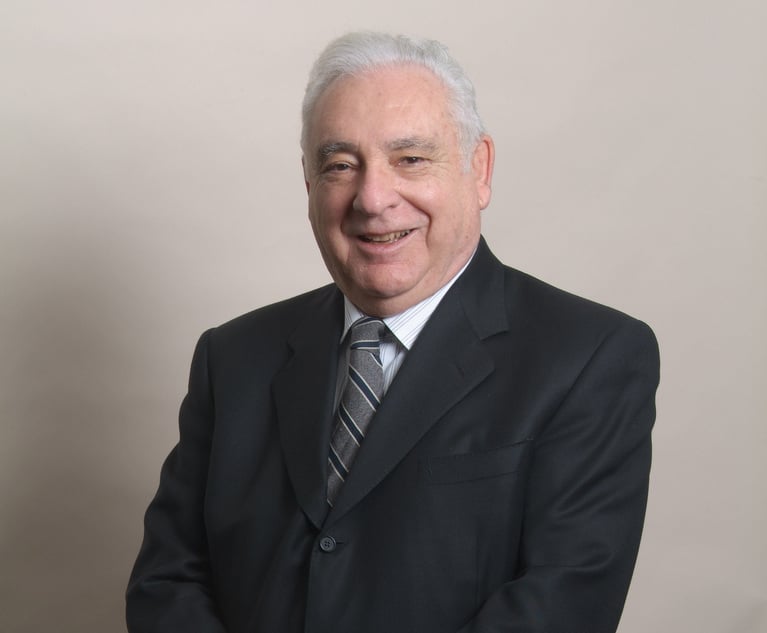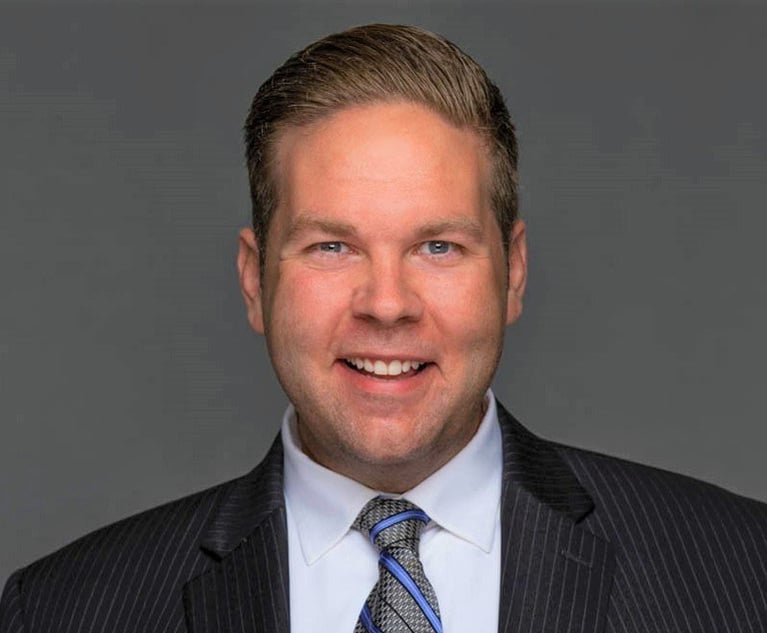Justices Probe Ability to Sue Successor Firms for Quantum Meruit
Can law firms that handed off a case to a successor firm recover its fees from the successor firm under a quantum meruit theory, or does the initiating firm need to sue the client?
October 17, 2017 at 04:17 PM
4 minute read
 Can law firms that handed off a case to a successor firm recover its fees from the successor firm under a quantum meruit theory, or does the initiating firm need to sue the client?
Can law firms that handed off a case to a successor firm recover its fees from the successor firm under a quantum meruit theory, or does the initiating firm need to sue the client?
That question was squarely before the state Supreme Court Tuesday morning in Meyer, Darragh, Buckler, Bebenek & Eck v. Malone Middleman—a case that could open up quantum meruit liability against successor law firms.
According to Meyer Darragh Buckler Bebenek & Eck attorney Scott Millhouse, the answer is simple: If the successor firm benefited from the first firm's work, the quantum meruit claim clearly lies with the successor firm.
“There's no dispute that Meyer Darragh did the work on this case for the client that was material to the ultimate result,” Millhouse said. “Malone Middleman [the successor firm] knew when it took on attorney [William] Weiler [who originated the case while he worked at Meyer Darragh] that Meyer Darragh expected to be paid for the work we'd done on that case.”
However, Ray Middleman, former managing partner of Malone Middleman who is now with Eckert Seamans Cherin & Mellott, said the situation is more complicated.
The dispute stems from a motor vehicle litigation where Weiler represented an estate involved in the case. Weiler began working on the case while at Meyer Darragh, but later joined Malone Middleman. When he left Meyer Darragh, Weiler agreed the firm could receive two-thirds of the attorneys fees. The client, however, subsequently retained Weiler again, and, following the change in representation, Malone Middleman contested the fee agreement, arguing it was not bound by the agreement between Weiler and Meyer Darragh.
According to Middleman, the “Middleman firm had also agreed to take a lesser fee from the client because of Meyer Darragh's prior involvement in the case. He argued that Meyer Darragh's claim lay with the client, and that case law from the Superior Court clearly established that initiating firms cannot bring quantum meruit claims against successor firms.
However, at least three justices questioned the validity of that case law.
Early in the argument session, Justice David N. Wecht asked, ”Why do we rigidly follow that if it doesn't follow equity? Why don't we follow the money?” And later in the session, Justice Christine Donohue also asked, ”How does that make sense if a firm is unjustly enriched?”
Middleman maintained that the claim lies with the client, since the settlement is ultimately where the now-disputed money came from, and the initiating firm must protect its interest in the fees.
“We cut the fee in consideration of the client's obligation to another firm,” Middleman said.
Justice Max Baer, however, questioned whether Middleman was raising that issue too late, and Chief Justice Thomas G. Saylor said Middleman should be more “worried” about the Supreme Court overruling any hard and fast rule saying successor firms can't be sued on quantum meruit theories.
“There's a holding of the intermediate court saying you can never sue a successor firm. Why is that good law?” Saylor asked.
Middleman replied again that the burden should be on the client.
“Putting the onus on a successor firm, I think is unreasonable,” he said, adding that disputes between the firms could also lead to burdensome discovery dispute.
Millhouse, however, argued that getting into questions about whether the successor firm reduced its fee should not have any impact on his firm's ability to recover.
“To me, it's a simple case. We did the work and we deserve to be paid for it,” Millhouse said. “The agreement was the agreement no matter who was handling the case. There's no reason for us to pursue the client. The client paid the entire amount they were required to pay.”
Max Mitchell can be contacted at 215-557-2354 or [email protected]. Follow him on Twitter @MMitchellTLI.
This content has been archived. It is available through our partners, LexisNexis® and Bloomberg Law.
To view this content, please continue to their sites.
Not a Lexis Subscriber?
Subscribe Now
Not a Bloomberg Law Subscriber?
Subscribe Now
NOT FOR REPRINT
© 2025 ALM Global, LLC, All Rights Reserved. Request academic re-use from www.copyright.com. All other uses, submit a request to [email protected]. For more information visit Asset & Logo Licensing.
You Might Like
View All

Samuel M. Lehrer, Retired Philadelphia Court of Common Pleas Judge, Dies
1 minute read

Longtime Reed Smith Health Care Partner Opts for Solo Practice Over Retirement
3 minute readTrending Stories
- 1Decision of the Day: Uber Cannot Be Held Vicariously Liable for Driver's Alleged Negligent Conduct
- 2TikTok Law and TikTok Politics
- 3California Supreme Court Vacates Murder Conviction in Infant Abuse Case
- 4New York’s Proposed Legislation Restraining Transfer of Real Property
- 5Withers Hires Lawyers, Staff From LA Trusts and Estates Boutique
Who Got The Work
Michael G. Bongiorno, Andrew Scott Dulberg and Elizabeth E. Driscoll from Wilmer Cutler Pickering Hale and Dorr have stepped in to represent Symbotic Inc., an A.I.-enabled technology platform that focuses on increasing supply chain efficiency, and other defendants in a pending shareholder derivative lawsuit. The case, filed Oct. 2 in Massachusetts District Court by the Brown Law Firm on behalf of Stephen Austen, accuses certain officers and directors of misleading investors in regard to Symbotic's potential for margin growth by failing to disclose that the company was not equipped to timely deploy its systems or manage expenses through project delays. The case, assigned to U.S. District Judge Nathaniel M. Gorton, is 1:24-cv-12522, Austen v. Cohen et al.
Who Got The Work
Edmund Polubinski and Marie Killmond of Davis Polk & Wardwell have entered appearances for data platform software development company MongoDB and other defendants in a pending shareholder derivative lawsuit. The action, filed Oct. 7 in New York Southern District Court by the Brown Law Firm, accuses the company's directors and/or officers of falsely expressing confidence in the company’s restructuring of its sales incentive plan and downplaying the severity of decreases in its upfront commitments. The case is 1:24-cv-07594, Roy v. Ittycheria et al.
Who Got The Work
Amy O. Bruchs and Kurt F. Ellison of Michael Best & Friedrich have entered appearances for Epic Systems Corp. in a pending employment discrimination lawsuit. The suit was filed Sept. 7 in Wisconsin Western District Court by Levine Eisberner LLC and Siri & Glimstad on behalf of a project manager who claims that he was wrongfully terminated after applying for a religious exemption to the defendant's COVID-19 vaccine mandate. The case, assigned to U.S. Magistrate Judge Anita Marie Boor, is 3:24-cv-00630, Secker, Nathan v. Epic Systems Corporation.
Who Got The Work
David X. Sullivan, Thomas J. Finn and Gregory A. Hall from McCarter & English have entered appearances for Sunrun Installation Services in a pending civil rights lawsuit. The complaint was filed Sept. 4 in Connecticut District Court by attorney Robert M. Berke on behalf of former employee George Edward Steins, who was arrested and charged with employing an unregistered home improvement salesperson. The complaint alleges that had Sunrun informed the Connecticut Department of Consumer Protection that the plaintiff's employment had ended in 2017 and that he no longer held Sunrun's home improvement contractor license, he would not have been hit with charges, which were dismissed in May 2024. The case, assigned to U.S. District Judge Jeffrey A. Meyer, is 3:24-cv-01423, Steins v. Sunrun, Inc. et al.
Who Got The Work
Greenberg Traurig shareholder Joshua L. Raskin has entered an appearance for boohoo.com UK Ltd. in a pending patent infringement lawsuit. The suit, filed Sept. 3 in Texas Eastern District Court by Rozier Hardt McDonough on behalf of Alto Dynamics, asserts five patents related to an online shopping platform. The case, assigned to U.S. District Judge Rodney Gilstrap, is 2:24-cv-00719, Alto Dynamics, LLC v. boohoo.com UK Limited.
Featured Firms
Law Offices of Gary Martin Hays & Associates, P.C.
(470) 294-1674
Law Offices of Mark E. Salomone
(857) 444-6468
Smith & Hassler
(713) 739-1250





